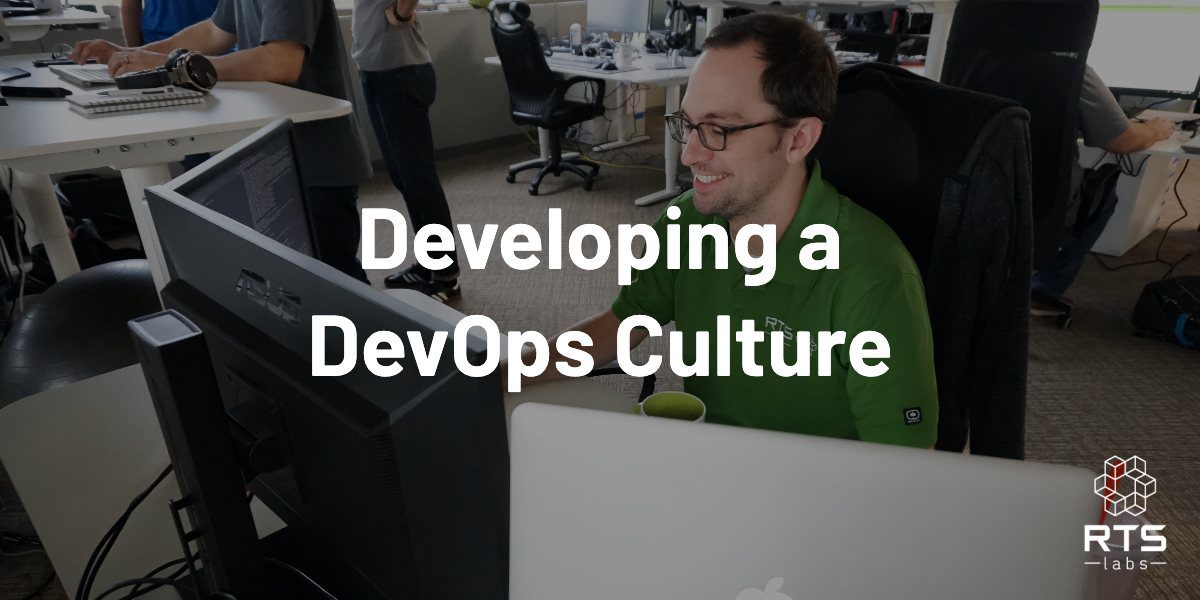What if we told you that one organizational change could help you accelerate your development cycle, minimize costs, and help your team create better software? That one change is developing a DevOps culture.
DevOps is a leaner, faster, more efficient method of development that requires a culture change, some retooling, and skill-building among your team. While it does require effort and drastic change, it’s definitely worth it (which is why we offer DevOps consulting). If you know your culture needs a change, use this quick reference guide to get started and see if this is the kind of change you need and want for your org. And, if at the end of this you’re ready to make the change, check out our DevOps consulting services and drop us a line!
What is “DevOps”?
DevOps is not a thing or product. It’s a development method that requires the collaboration of your development team and your IT or operations team. In a DevOps environment, developers don’t just hand over their code to operations to be added to your infrastructure. The two teams work collaboratively on smaller builds and rely on automation to take the laborious work out of the process. Rather than having a separate development and production environment, the two environments are the same and the teams build and implement together.
While moving towards a DevOps culture requires a transformation within your business and its culture, the benefits are that you can deploy new products and features faster. It’s more of a culture than it is a change in tools or software. If you really want to transform your business and develop a DevOps culture, there are a few principles your team will need to incorporate. Use these eight strategies to help develop a strong, collaborative DevOps culture within your organization.
Start at the top
As with any culture change, the change has to come from the top if it’s truly to take hold and be effective. The leadership within your organization needs to understand what it means, and they need to help drive the change within your culture. You cannot just merge your development and operations teams and leave them to figure out how to work together. Both teams need to be reminded of their value first. Then, a clear strategy for transforming workflows and assigning ownership needs to be laid out, which is where DevOps consulting can help.
Foster a collaborative environment
You can’t force two teams together and expect them to communicate and work collaboratively without fostering the right kind of environment where that can happen. Silos need to be broken down, new processes need to form, and common objectives need to be set. Building a collaborative culture takes work. In order for both teams to work together, the following groundwork needs to be laid.
- Both teams need to have an understanding of what each team does.
- Both teams need to feel mutually responsible for each other and understand that they are now one team.
- Harmful habits and attitudes towards the way things have always been done need to be eradicated.
- Transparency needs to happen. The entire toolchain needs to be visible. Duties and roles should be assigned. Everyone should be in the loop.
Start by doing. Get a quick win and a sense for working together by launching something small. If you’re finding this piece difficult, it helps to get a neutral party on board to help facilitate better collaboration. DevOps consulting can be very beneficial as consultants are used to navigating clashes between teams.
Use incentives
There’s nothing wrong with incentives, but you need to be mindful of what you’re rewarding. Incentivize your new DevOps team for working together and reward them for delivering better customer experiences. Don’t forget to celebrate successes. While you won’t be working towards one big launch, taking some time to celebrate milestones and even small launches is important.
Have a champion from both teams
Another great way to ensure collaboration among your newly merged DevOps team is to identify a champion from both teams. These two people will be your DevOps cheerleaders. They should be enthusiastic about the change and respected among their peers. It’s always great to have a few champions that can help drive excitement and keep the team on task so bad attitudes and habits don’t develop.
Give everyone a sense of ownership
Giving everyone a sense of ownership is going to be crucial when creating your DevOps culture. When a developer builds a product or service, they need to own that product or service through to production (and until it’s dead). Your developers are no longer just handing code off. They are following the product or feature through to its completion.
Workflows and ownership should be understood among everyone on the team and everyone needs to know who “owns” which part of the infrastructure.
Embrace continuous testing and deployment
Building faster, better, and smarter can’t happen without the right tools. Another part of adopting DevOps is employing automation in order to gain efficiencies from automating specific tasks and to remove human error.
Testing is one of those tasks that can be done automatically – on a continuous basis. Testing should be done throughout the delivery pipeline with every change. The goal here is to shorten the time between check-in and release.
Once tested and approved, there should be no lag time. Deployment in a DevOps environment is also continuous. Get it out. This continuous workflow removes the need for human intervention and allows for the quick delivery of new features and updates.
Embrace continuous improvement
Another strong tenet of a DevOps culture is a focus on continuous improvement. Being able to build and to deploy faster gives your team the room to focus on constantly improving. Optimization is the name of the game.
Be more customer-centric
Ultimately, the goal is to make better products and provide increasing value to users and/or customers. If everyone leaves their egos at the door and focuses on delivering a great product, then everyone wins. DevOps is just a leaner and faster way to create great products and produce results.
By adopting a strong DevOps culture, your company will be able to clock a faster time to market, respond faster to market needs, spend more time on activities that add value, and have happier customers, better collaboration, better workflows, and a happier team.
Sounds amazing, right? If you’re thinking a culture change like this could be right for you – and you want to make sure you do it right – schedule your own personalized DevOps assessment session with the RTS Labs client DevOps consulting team. You can ask questions and get honest feedback about what it would take to create a DevOps culture within your organization.






